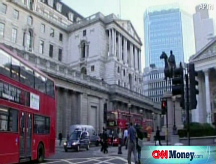Dollar rallies against euro, pound
The greenback is at a 21-month high against the 15-nation currency as the global rebound appears slower than in the U.S.
NEW YORK (CNNMoney.com) -- The dollar climbed to a nearly 2-year high against the euro Wednesday as fears that the economic recovery overseas will be slow in coming pushed investors toward the U.S. dollar.
"This is a global story [and] the way it appears right now is that the U.S. is the best house in a bad neighborhood," said Gareth Sylvester, senior currency strategist at HiFX in San Francisco.
Compared with other currencies around the globe, the greenback was perceived as a safer haven amid a growing feeling that the U.S. government's bailout efforts will lead to a faster rebound in the U.S. versus other countries.
The euro cost $1.2832, down from $1.3062. The euro hasn't traded this low since January 2007.
On Wednesday, British Prime Minister Gordon Brown echoed comments made a day earlier by Bank of England Governor Mervyn King that the United Kingdom, along with other countries, is pushing toward a recession. King on Tuesday also hinted that a U.K. rate cut may be on the horizon.
The dollar rallied against the British pound Wednesday. The pound cost $1.6254, down from $1.67055 late Tuesday.
There is a growing feeling that, not only the Bank of England but more European central banks will look to cut interest rates soon. Central banks lower lending rates in order to spur economic growth.
"The real core issue here is that U.S. rates are low, but I think U.K. rates and euro rates can fall," said Tom Benfer, director of foreign exchange at BMO Capital Markets.
"From last year [the U.S.] has already been on an aggressive rate cutting campaign," said Benfer. The Federal Reserve's key interest rate is at 1.5%, compared with the European Central Bank at 3.75% and the Bank of England at 4.5%.
While investors typically make investment decisions in order to gain the best possible return, Sylvester said the focus has shifted to not losing any value of the principal investment.
"It is not about yield anymore, it is not about growth outlook, it is about capital preservation," said Sylvester.
However, the greenback slid against the Japanese yen, which typically signals risk aversion on the part of investors. The dollar bought ¥97.86, down from ¥100.14. ![]()



